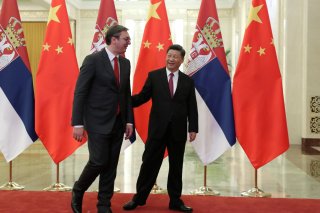The Dragon Lands in Belgrade: The Drivers of Sino-Serbian Partnership
Now as Europeans are being more aware of the China challenge and with Sino-American rivalry heating up, great power politics will knock on Serbia’s doors.
Russian medical aid arriving in Belgrade was not greeted by the Serbian leadership with the same enthusiasm, indicating that Belgrade has replaced Moscow with Beijing as its primary non-Western partner. This transformation can be attributed to China’s endowment with capabilities that Russia simply does not have. It could also be down to the latent distrust which still exists between Russia and Serbia. Namely, while Serbia relies on Russia in the Kosovo dispute, it fears that Russia could sell it out in a hypothetical bargain with the United States. In that regard, Serbia was willing to break its practice of diplomatic neutrality by backing China on the issues of Hong Kong and Xinjiang, something it was not ready to do in the case of Russia.
The same pattern is also seen in the case of Chinese “vaccine diplomacy.” As the EU failed to provide COVID-19 vaccines to the Balkan countries in a timely manner, Serbia turned to China. In January 2021, one million doses of Chinese Sinopharm vaccines were delivered to Serbia. In March, an agreement for an additional two million doses was reached. At one point, Serbia was second in Europe, after the UK, for its vaccination rollout program. Again, the Russian vaccines were not greeted in the same welcoming manner as their Chinese counterparts.
Thanks to the Chinese vaccines, Serbia can now exercise its own version of vaccine diplomacy in the Balkans by donating to its neighbors for favorable terms—notably in regions like Africa, where it donates vaccines to ensure these countries do not recognize Kosovo. The plan to open a Sinopharm production facility in Serbia, with financing from China and the UAE, will make Serbia a regional supply hub for COVID-19 vaccines. Evidently, even when it comes to vaccine diplomacy, Serbia remains a springboard for Beijing’s wider goals.
For the Serbian leadership, the influx of Chinese capital has become relevant domestically, as it can promote itself to its domestic constituents as the facilitator of a favorable partnership with China. The arrival of Chinese capital frequently corresponds with local political cycles. At the same time though, secretive contracts with China enable local cronyism. Indeed, the agreements concerning the 2020 Chinese medical aid remain confidential, and so do the price of Chinese drones and Chinese vaccines. In addition, Chinese projects are followed by questionable environmental and labor standards. By late 2020, the incumbent elite’s pro-Chinese narrative resulted in 16 percent of Serbs believing that China is their greatest friend, second only to Russia with 40 percent. In 2021, 77 percent of citizens qualified Chinese influence in the country as positive.
HOW DURABLE is this partnership? As relations between China and the West deteriorate, the Sino-Serbian partnership will be under intense duress, as Serbia’s main partners remain in the West. Serbia’s foreign policy of hedging and balancing is a tactical and opportunist policy pursued only as long as there remains a systemic leeway.
The EU is already showing uneasiness about China, with its strategic documents describing China as “a systemic rival.” Moreover, the EU is growing weary of Huawei’s presence in its vital infrastructure, and is working on eliminating it on security grounds. In May 2021, the European Parliament blocked the Comprehensive Agreement on Investment, a deal aimed to boost trade and investment between China and the EU, because of China’s human rights violations in Xinjiang. After the 16+1 initiative became the 17+1, with Greece joining in 2019, it reverted back to 16+1 earlier this year when Lithuania left the initiative. The project remains burdened with political dysfunction, growing dissatisfaction, and many members doubting its validity.
The determining factor of the relationship, however, will be the United States and its preponderance. Consider, for example, that in late 2019, Serbia temporarily gave up on purchasing weapons from Russia when faced with a threat of U.S. financial sanctions. There is no doubt that the United States will act in the same way regarding China, its only real great-power competitor. As Sino-American rivalry intensifies, it will inevitably reach Serbia.
In September 2020, the Trump administration mediated an agreement on economic normalization between Serbia and Kosovo, which stipulated that “both parties will prohibit the use of 5G equipment supplied by untrusted vendors,” a rather clear reference to Huawei. As a result, in late 2020, Serbia postponed the tender for the 5G spectrum. The U.S. embassy in Belgrade has already publicly shown concern for the Serbian plan to purchase a Chinese anti-aircraft FK-3 system. The Biden administration has demonstrated, much like its predecessor, that it is going to be tough on China. President Joe Biden has already banned U.S. companies from investing in fifty-nine Chinese tech and defense companies.
So far, Serbia has been kicking the can down the road, expecting that it can continue on its extant course of partnering with China, not minding the global game of great power politics. Now, as Europeans are becoming more aware of the China challenge and with Sino-American rivalry heating up, great power politics will knock on Serbia’s doors. Maintaining a balance between great powers without choosing sides will become even more challenging for Belgrade in the age of China’s rise. Serbia will soon be faced with some fateful choices.
Vuk Vuksanović is a senior researcher at the Belgrade Centre for Security Policy (BCSP) and an associate of LSE IDEAS, a foreign policy think tank of the London School of Economics and Political Science (LSE ). The piece is based on a strategic update he wrote as Mladena and Dianko Sotirov Visiting Fellow at lse IDEAS in 2021.
Image: Reuters.

